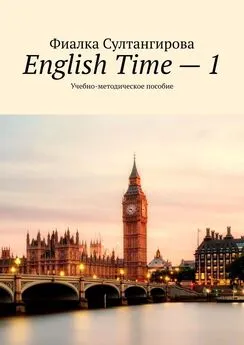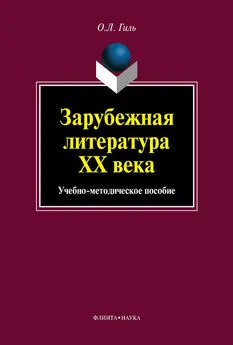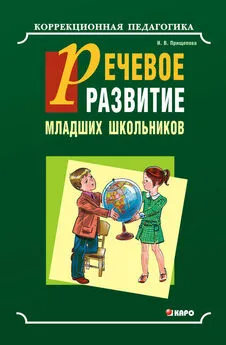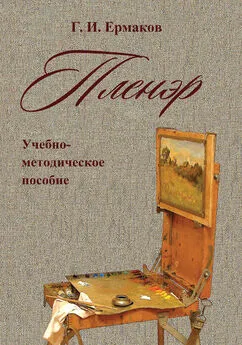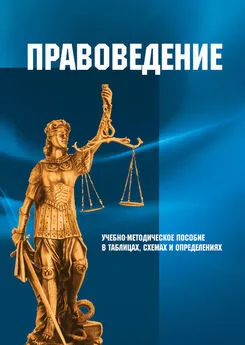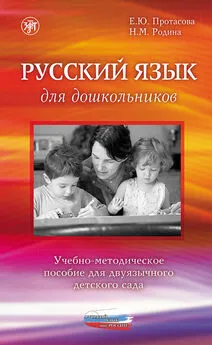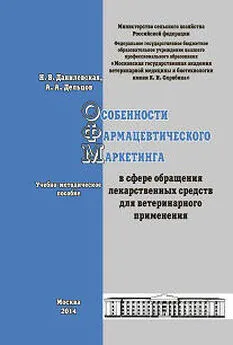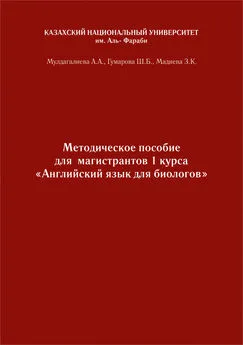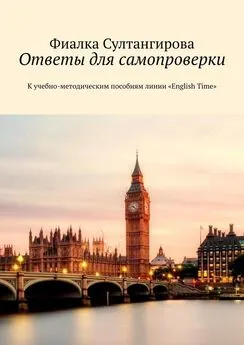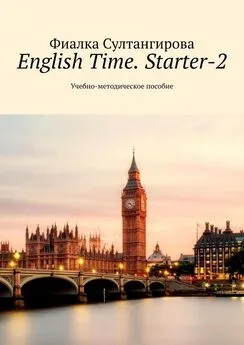Фиалка Султангирова - English Time – 1. Учебно-методическое пособие
- Название:English Time – 1. Учебно-методическое пособие
- Автор:
- Жанр:
- Издательство:неизвестно
- Год:неизвестен
- ISBN:9785005383587
- Рейтинг:
- Избранное:Добавить в избранное
-
Отзывы:
-
Ваша оценка:
Фиалка Султангирова - English Time – 1. Учебно-методическое пособие краткое содержание
English Time – 1. Учебно-методическое пособие - читать онлайн бесплатно ознакомительный отрывок
Интервал:
Закладка:
Занятие №5. Работа по теме «My Family» (местоимения / глагол to be)
ЛЕКСИКА
I want to tell you about my family. – Я хочу рассказать вам о своей семье.
large – большой
ride a bike – кататься на велосипеде
play the piano – играть на пианино
good marks – хорошие оценки
a pensioner – пенсионер
an engineer – инженер
a bookkeeper – бухгалтер
a nurse – медсестра
a secretary – секретарь
a baker – пекарь
a grocer – бакалейщик
a driver – водитель
a director – директор
a student – студент
in the evening – вечером
all members – все члены
ЧТЕНИЕ
My name is Billy. I am 11. I am a pupil. I can read and write. But I can’t ride a bike.
This is my family. It is not large. I have a father, a mother, a brother, a sister, a grandmother and a grandfather.
My father’s name is Tomas. He is a driver. He is 54. My mother’s name is Martha. She is a baker. She is 50. I love my parents very much.
My sister’s name is Beth. She is 18. She is a student. She study at the University.
My brother’s name is Ben. He is 26. He is an engineer. We are good friends.
My grandmother and grandfather are my father’s parents. They are pensioners. They are very nice and kind.
ЗАДАНИЯ
1. О ком эти предложения?
а) She is a student.
b) He is a driver.
c) They are pensioners.
2. Ответьте на вопросы:
Can Billy ride a bike?
Is Billy’s father a doctor?
Is Billy’s mother 50?
Who is Beth?
ОБРАЗЕЦ УСТНОЙ РЕЧИ УЧАЩИХСЯ (МОНОЛОГА)
1. Hello! My name is ……..
2. I want to tell you about my family.
3. My family is large. I’ve got a mother, a father, a sister, a brother, a grandmother….
4. My mother’s name is __________.
5. She is _____ (forty, thirty-five, thirty)
6. She is a doctor (a bookkeeper, a nurse, a secretary, a teacher, etc.)
7. My father’s name is _______.
8. He is ____ (forty, forty-two, etc.)
9. He is a worker (a baker, a grocer, a driver, a director)
10. I have (haven’t) got a sister (a brother).
11. Her (His) name is _________.
12. She (He) is _______ (18, 20…).
13. She (He) is a student.
14. In the evening all members of our family like to watch TV (play games…)
15. That’s all I want to tell you about my family.
Занятия №№6—8. Чтение буквосочетаний ee, ea, ck, ng, oo, kn, sh, ph, ch, th, wr, wh. Настоящее продолженное время
ЧТЕНИЕ
ee [i: ] – tree, bee, see
ea [i: ] tea, sea, meat
ck [k] – stick, back, Nick
ng [ɳ] – song, ring, sing, long
oo [u] – book, look, school, pool
kn [n] – knee, know, knife
sh [ʃ] – she, fish, shop
ph [f] – phone, photo, phloy
ch [ʧ] – cheese, catch, peach, match
th [ð] / [θ] – this, that, think, thank
wr [r] – wrong, write, wrist
wh [w] – what, why, where, when
ГРАММАТИКА
Настоящее продолженное время употребляется, когда речь идет о событиях, которые происходят в данный момент (сейчас).
Слова-маркеры настоящего продолженного времени:
now – сейчас
at the moment – в данный момент
still – все еще
Look! – Посмотри!
Listen! – Послушай!
Правило образования:
За подлежащим, выраженным местоимением или существительным, идет вспомогательный глагол to beи основной глагол с окончанием -ing.
I + am + V ing
He / She / It + is + V ing
We / You / They + are + V ing
Например:
I amdanc ingnow. – Я танцую сейчас.
He isdanc ingnow. – Он танцует сейчас.
They aredanc ingnow. – Они танцуют сейчас.
Образование утвердительных предложений
в настоящем продолженном времени.

Есть некоторые правила:
– У глаголов, заканчивающихся на — e , уходит конечная гласная:
com e – com ing (приходить),
mak e – mak ing (делать),
writ e – writ ing (писать).
– У глаголов, заканчивающихся на — ie , гласные — ie заменяются на — y :
l ie — l ying (лежать),
t ie – t ying (завязывать),
d ie – d ying (умирать).
– Если короткий глагол заканчивается на гласную с согласной, тогда эта согласная удваивается:
swi m – swi mm ing (плавать),
sto p – sto pp ing (останавливаться),
ge t – ge tt ing (получать).
Примечание:
Глаголы, выражающие чувства восприятия и умственную деятельность в данном времени не употребляются.
to want – хотеть ,
to like – нравиться ,
to love – любить ,
to wish – желать ,
to see – видеть ,
to hear – слышать ,
to feel – чувствовать ,
to notice – замечать ,
to remember – помнить ,
to recognize – узнавать ,
to forget – забывать ,
to seem – казаться ,
to be – быть
УПРАЖНЕНИЯ
Упражнение 1. Вставьте нужную форму вспомогательного глагола BE (am, is, are)в предложения. Переведите их на русский язык.
1. I __________reading a book.
2. We _________drinking coffee.
3. They _______ baking a cake.
4. She ________looking through the window.
5. He ________helping about the house.
6. You __________ watching TV.
7. Grandpa _________reading a newspaper.
8. The kitten _________sleeping.
Упражнение 2. Переделайте предложения так, чтобы глаголы стояли в Present Continuous.
1. I (close) the door.
2. The puppy (sleep) on the mat.
3. The bоуs (write) letters.
4. We (sing) songs.
5. Mother (make) a pie.
6. The bell (ring).
7. The man (drive) a car.
8. You and your brother (play) football.
Упражнение 3. Поставьте глаголы в скобках в Present Continuous.
1. It (rain) all day.
2. I (play) the piano now.
3. Diana (drink) tea.
4. The boy (climb) the tree.
5. The baby (drink) milk.
6. My friends (speak) English.
7. We (read) a magazine.
8. You (write) a letter to your friend.
Занятия №№9—10. Описание фотографий и изображений (настоящее продолженное время)
ПЛАН ОПИСАНИЯ КАРТИНКИ
1. I’d like to describe a picture number…
2. The picture shows us…a nice/ hot/ cold/ warm/ rainy/ summer/ winter/ spring/ autumn day.
3. The photo was takenoutside/ inside.
4. The action is taking place at school/ at home/ in the supermarket/ in the park/ in the gym/ in the café/ in the city centre/ in the countryside.
5. In the picture I can see…a boy/ a girl/ a woman/ a man/ a child/ boys/ girls/ city/ monument/ house/ Big Ben/ bridge/ nature/ landscape
6. The boy/ the girl/ the woman/ the man/ the child/ boys/ girls/ city/ monument/ house/ Big Ben/ bridge/ nature/ landscape looks/ look nice/ great.
7.1. He/ She has gotdark/ fair hair. He/ She has gotbrown/ blue/ green eyes.
7.2. The building isold and high. It is very pleasant to look at.
7.3. The landscape isbeautiful. Everything is green and peaceful. The picture is very vivid.
8. He/She is wearinga dress/ a T-shirt/ a shirt/ jeans/ a skirt/ a jacket/ trousers…
9. The boy/ the girl isreading a book/ playing a computer game/ watching TV/ cooking/ playing tennis/ playing hockey/ watching video/ flying on a plane/ playing football/ relaxing.
10. In the background there aretrees/…
11. I like the picture, because it’s full of positive emotions and reminds me of school/ summer/ holidays/ my trip to London/ my granny/ my friends/ my childhood.
12. Besides I like to read/… too.
ОБРАЗЕЦ УСТНОЙ РЕЧИ УЧАЩИХСЯ (МОНОЛОГА)
1. I’d like to describe a picture.
2. The picture shows a girl/ a boy/ a man/ a woman.
3. She/He is outside/ inside/ in the garden/ in the park/ a school/ at the café/ at the gym…
Конец ознакомительного фрагмента.
Текст предоставлен ООО «ЛитРес».
Прочитайте эту книгу целиком, купив полную легальную версию на ЛитРес.
Читать дальшеИнтервал:
Закладка:
